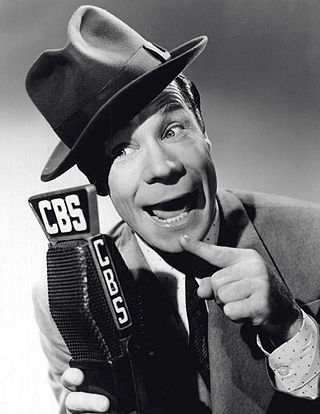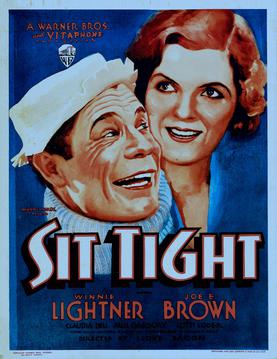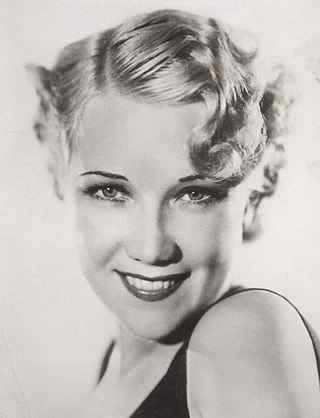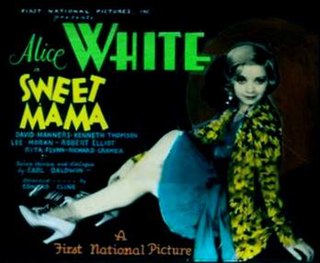This is a list of notable events in music that took place in the year 1930.

Margaret Eleanor Whiting was an American singer of popular music and country music who gained popularity in the 1940s and 1950s.

Joseph Evans Brown was an American actor and comedian, remembered for his friendly screen persona, comic timing, and enormous, elastic-mouth smile. He was one of the most popular American comedians in the 1930s and 1940s, and enjoyed lengthy careers in both motion pictures and radio. Later he became a character actor and comedian, as in Some Like It Hot (1959), in which he utters the film's famous punchline "Well, nobody's perfect."

The Life of the Party is a 1930 American pre-Code musical comedy filmed entirely in Technicolor. The musical numbers of this film were cut out before general release in the United States because the public had grown tired of musicals by late 1930. Only one song was left in the picture. The complete film was released intact in countries outside the United States where a backlash against musicals never occurred.

Sit Tight is a 1931 American Pre-Code musical comedy film, directed by Lloyd Bacon, written by Rex Taylor, edited by James Gibbon, and produced and distributed by Warner Bros. It was originally intended as a full musical, but due to the backlash against musicals, all the songs were cut from the film except for one – sung by Winnie Lightner – in all release prints in the United States.

Gold Dust Gertie is a 1931 American pre-Code musical comedy produced and released by Warner Brothers. It was originally completed as a full musical. Due to the backlash against musicals, however, all the songs were cut from the film in all release prints in the United States. The film was originally known as Red Hot Sinners, but was released as Gold Dust Gertie after the musical numbers had been cut. The film was based on the play The Wife of the Party by Len D. Hollister. The film stars Winnie Lightner, Ole Olsen, Chic Johnson and Claude Gillingwater.

Kiss Me Again is a 1931 American pre-Code musical operetta film filmed entirely in Technicolor. It was originally released in the United States as Toast of the Legion late in 1930, but was quickly withdrawn when Warner Bros. realized that the public had grown weary of musicals. The Warner Bros. believed that this attitude would only last for a few months, but, when the public proved obstinate, they reluctantly re-released the film early in 1931 after making a few cuts to the film.

Men of the Sky is a 1931 all-talking American pre-Code musical drama film, directed by Albert E. Green which was produced by Warner Bros. in 1930 and released in 1931. Men of the Sky stars Irene Delroy and Jack Whiting. Although aircraft were seen in the film, Men of the Sky was more of a spy drama.

Sunny is a 1930 American pre-Code musical comedy film directed by William A. Seiter and starring Lawrence Gray, O. P. Heggie, and Inez Courtney. It was produced and released by First National Pictures. The film was based on the Broadway stage hit, Sunny, produced by Charles Dillingham, which played from September 22, 1925, to December 11, 1926. Marilyn Miller, who had played the leading part in the Broadway production, was hired by Warner Brothers to reprise the role that made her the highest-paid star on Broadway.

Follow Thru is a 1930 American pre-Code musical romantic comedy film photographed entirely in Technicolor. It was the second all-color, all-talking feature to be produced by Paramount Pictures. The film was based on the hit 1929 Broadway musical of the same name by Lew Brown, B. G. DeSylva, Ray Henderson and Laurence Schwab. The musical ran a total of 401 performances from January 9, 1929, to December 21, 1929. Jack Haley and Zelma O'Neal, who starred in the Broadway production, reprised their roles in the film version.

Going Wild is a 1930 Warner Brothers pre-Code comedy film based on the 1910 play The Aviator by James Montgomery and directed by William A. Seiter. The film stars many musical stars along with Joe E. Brown, Frank McHugh and Johnny Arthur.

Bernice Claire was an American singer and actress. She appeared in 13 films between 1930 and 1938.

A Soldier's Plaything is a 1930 American pre-Code comedy-drama film with songs directed by Michael Curtiz. Warner Bros. filmed it simultaneously in 35mm and in a widescreen process called Vitascope, but it is uncertain whether the Vitascope version was ever released. The film was planned as a full-scale musical comedy, but most of the musical numbers were cut out before general release in the United States, because the public had grown tired of musicals by late 1930. This accounts for the short length of the film. The complete film was released intact in other countries where audiences still appreciated musicals. It is unknown whether a copy of the full version still exists.

Maybe It's Love is an all-talking 1930 pre-Code American musical comedy film produced and distributed by Warner Bros. and directed by William A. Wellman. The movie stars Joan Bennett, Joe E. Brown and James Hall. The film is based on George Ade's 1904 play The College Widow and is a remake of Warner's own 1927 silent version of the story, which starred Dolores Costello. The play had also been filmed in 1915, starring Ethel Clayton.

Big Boy is a 1930 American Pre-Code musical comedy film produced by Warner Bros. The film was directed by Alan Crosland and stars Al Jolson, Claudia Dell, Louise Closser Hale, and Noah Beery. The film is based on the 1925 Broadway hit show of the same name in which Jolson also starred.

Spring Is Here is a 1930 American Pre-Code musical comedy film produced by First National Pictures and distributed by Warner Bros. It was adapted by James A. Starr from the 1929 musical play, of the same name, by Owen Davis, with music by Richard Rodgers and Lorenz Hart. The film stars Lawrence Gray, Alexander Gray, and Bernice Claire.

College Lovers is a 1930 American talkie Pre-Code comedy film produced and released by First National Pictures, a subsidiary of Warner Bros., and directed by John G. Adolfi. The movie stars Jack Whiting, Marian Nixon, Frank McHugh and Guinn 'Big Boy' Williams. The film was based on the story by Earl Baldwin.

Numbered Men is a 1930 American pre-Code prison drama film produced and released by First National Pictures, a subsidiary of Warner Bros., and directed by Mervyn LeRoy. The movie stars Bernice Claire, Conrad Nagel, Raymond Hackett and Ralph Ince. The film was based on the play entitled Jail Break by Dwight Taylor.

Sweet Mama is a 1930 American pre-Code talkie comedy drama film with songs, which was directed by Edward F. Cline and produced and distributed by First National Pictures. The film stars Alice White, David Manners, Kenneth Thomson and Rita Flynn. Planned as a full-scale musical, and released as such for a short time in the summer of 1930, most of the songs were cut from general release prints by the autumn of 1930 due to the public's aversion for musicals.
Top Speed is a musical in two acts with music by Harry Ruby, lyrics by Bert Kalmar, and a book co-authored by Guy Bolton, Ruby, and Kalmar. The musical is set at the Onawanda Lodge, a fictional resort in the Thousand Islands that sits on the American side of the Canada–United States border in New York. The story follows two young and financially poor American men who fall in love with two wealthy American heiresses while vacationing far above their economic means. Misadventures ensue when the boys are asked to pilot a speed boat owned by one of the girls in an international boat race.



















